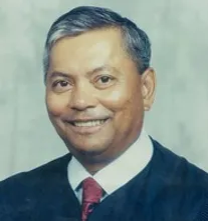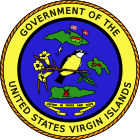
Politics of the Northern Mariana Islands takes place in a framework of a presidential representative democratic system, whereby the Governor is head of government, and of a pluriform multi-party system. The Northern Mariana Islands is an unincorporated territory of the United States, and in a political union with it in the form of a commonwealth. Executive power is exercised by the governor. Legislative power is vested in the two chambers of the legislature. The judiciary is independent of the executive and the legislature. Local government is carried out through four regional mayors.

Politics of the United States Virgin Islands takes place in a framework of a presidential representative democratic dependency, whereby the governor is the head of the territory's government, and of a multi-party system. United States Virgin Islands are an unincorporated and organized territory of the United States, administered by the Office of Insular Affairs of the United States Department of the Interior. Executive power is exercised by the local government of the Virgin Islands. The judiciary is independent of the executive and the legislature.
Nonpartisan democracy is a system of representative government or organization such that universal and periodic elections take place without reference to political parties. Sometimes electioneering and even speaking about candidates may be discouraged, so as not to prejudice others' decisions or create a contentious atmosphere.

In the politics of the United States, elections are held for government officials at the federal, state, and local levels. At the federal level, the nation's head of state, the president, is elected indirectly by the people of each state, through an Electoral College. Today, these electors almost always vote with the popular vote of their state. All members of the federal legislature, the Congress, are directly elected by the people of each state. There are many elected offices at state level, each state having at least an elective governor and legislature. There are also elected offices at the local level, in counties, cities, towns, townships, boroughs, and villages; as well as for special districts and school districts which may transcend county and municipal boundaries.

Midterm elections in the United States are the general elections that are held near the midpoint of a president's four-year term of office, on Election Day on the Tuesday after the first Monday in November. Federal offices that are up for election during the midterms include all 435 seats in the United States House of Representatives, and 33 or 34 of the 100 seats in the United States Senate.

Elections in the British Virgin Islands are conducted to elect members to the House of Assembly. In the British Virgin Islands elections are not conducted in relation to appointments to either the Executive or Judicial branches of Government, and there are no other publicly elected posts in the British Virgin Islands. Most elections are conducted as general elections, which under the Constitution are required to be held every four years, or as by-elections when a member of the House of Assembly dies or steps down. Since the re-introduction of democracy into the British Virgin Islands in 1950 there have been fifteen general elections, and three recorded by-elections. The last election was held on 25 February 2019.

The Democratic Party of the Virgin Islands is a political party in the U.S. Virgin Islands, and is affiliated with the Democratic Party at the nationwide level. It won the gubernatorial election of 2022 when the incumbent Democratic governor Albert Bryan was elected with 56 percent of the vote. In the last lesiglative election in November 2022, the party won 11 out of 15 seats in the Legislature of the Virgin Islands. Out of 30,000 active registered voters in the U.S. Virgin Islands, approximately 20,000 voters are registered Democrats.

The Republican Party in the Virgin Islands is a political party in the U.S. Virgin Islands, and is affiliated with the Republican Party at the national level.

An off-year election in the United States typically refers to a general election held in an odd-numbered year when neither a presidential election nor a midterm election takes place. At times, the term "off-year" may also be used to refer to midterm election years, while the term "off-cycle" can also refer to any election held on another date than Election Day of an even-numbered year.
At large is a description for members of a governing body who are elected or appointed to represent a whole membership or population, rather than a subset. In multi-hierarchical bodies, the term rarely extends to a tier beneath the highest division. A contrast is implied, with certain electoral districts or narrower divisions. It can be given to the associated territory, if any, to denote its undivided nature, in a specific context. Unambiguous synonyms are the prefixes of cross-, all- or whole-, such as cross-membership, or all-state.

The Northern Mariana Islands Commonwealth Legislature is the territorial legislature of the U.S. commonwealth of the Northern Mariana Islands. The legislative branch of the territory is bicameral, consisting of a 20-member lower House of Representatives, and an upper house Senate with nine senators. Representatives serve two-year terms and senators serve four-year terms, both without term limits. The territorial legislature meets in the commonwealth capital of Saipan.
In the United States, a governor serves as the chief executive and commander-in-chief in each of the fifty states and in the five permanently inhabited territories, functioning as head of state and head of government therein. While like all officials in the United States, checks and balances are placed on the office of the governor, significant powers may include ceremonial head of state, executive, legislative, judicial, and military. As such, governors are responsible for implementing state laws and overseeing the operation of the state executive branch. As state leaders, governors advance and pursue new and revised policies and programs using a variety of tools, among them executive orders, executive budgets, and legislative proposals and vetoes. Governors carry out their management and leadership responsibilities and objectives with the support and assistance of department and agency heads, many of whom they are empowered to appoint. A majority of governors have the authority to appoint state court judges as well, in most cases from a list of names submitted by a nominations committee.
Voting rights of United States citizens who live in Puerto Rico, like the voting rights of residents of other United States territories, differ from those of United States citizens in each of the fifty states and the District of Columbia. Residents of Puerto Rico and other U.S. territories do not have voting representation in the United States Congress, and are not entitled to electoral votes for president. The United States Constitution grants congressional voting representation to U.S. states, which Puerto Rico and other U.S. territories are not, specifying that members of Congress shall be elected by direct popular vote and that the president and the vice president shall be elected by electors chosen by the states.

The 2008 United States elections were held on Tuesday, November 4, 2008, during the war on terror and the onset of the Great Recession. It was considered a Democratic wave election, with Democratic Senator Barack Obama of Illinois defeating Senator John McCain of Arizona by a wide margin, and the Democrats bolstering their majorities in both chambers of Congress, thereby marking the first time since 1992 in which the Democrats won Congress and the presidency in one election.

The Northern Mariana Islands' first election of a delegate to the United States House of Representatives took place on November 4, 2008. Since the CNMI traditionally had general elections in odd-numbered years, the November 2008 ballot contained only this office.

The election of the president and for vice president of the United States is an indirect election in which citizens of the United States who are registered to vote in one of the fifty U.S. states or in Washington, D.C., cast ballots not directly for those offices, but instead for members of the Electoral College. These electors then cast direct votes, known as electoral votes, for president and for vice president. The candidate who receives an absolute majority of electoral votes is then elected to that office. If no candidate receives an absolute majority of the votes for president, the House of Representatives elects the president; likewise if no one receives an absolute majority of the votes for vice president, then the Senate elects the vice president.

The 2012 United States elections took place on November 6, 2012. Democratic President Barack Obama won reelection to a second term and the Democrats gained seats in both chambers of Congress, retaining control of the Senate even though the Republican Party retained control of the House of Representatives. As of 2024, this is the most recent election cycle in which neither the presidency nor a chamber of Congress changed partisan control, and the last time that the party that won the presidency simultaneously gained seats in both the House of Representatives and the Senate.
Voting rights of citizens in Guam differ from those of United States citizens in each of the fifty states. In the U.S. House of Representatives, Guam is entitled to a delegate, who is not allowed to vote on the floor of the House, but can vote on procedural matters and in House committees. Citizens of Guam may not vote in general elections for President.

The 2016 United States elections were held on Tuesday, November 8, 2016. Republican nominee Donald Trump defeated Democratic former Secretary of State Hillary Clinton in the presidential election, while Republicans retained control of Congress. This marked the first time Republicans won or held unified control of the presidency and Congress since 2004, and would not do so again until 2024.
The 1970 United States Virgin Islands general election in large part took place on November 3, 1970, to elect public officials in the United States Virgin Islands, with a run-off for the gubernatorial race taking place on November 17, 1970.













